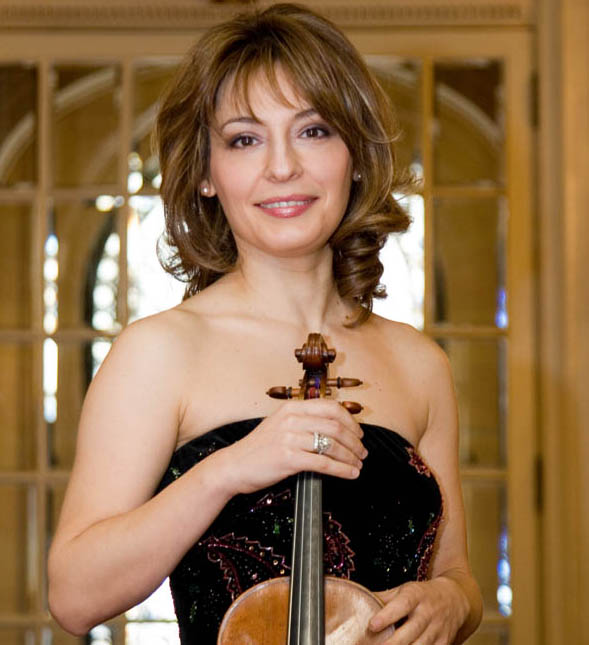
VERTICAL ENERGY: Irina Muresanu, violinist |
The word “concerto” comes from the Italian for “to bring into agreement,” and it’s not always as easy as soloists and symphony orchestras make it seem. Case in point: last Saturday’s performance of the Tchaikovsky Violin Concerto by Irina Muresanu with Jonathan McPhee and the Lexington Symphony. McPhee, as his many local fans can attest (he also leads the Longwood Symphony Orchestra, the Nashua Symphony Orchestra, and the Boston Ballet Orchestra), favors fleet (but not driven) tempi, cogent phrasing, danceable rhythms, bright orchestral colors, and a balance that’s not string-heavy. Muresanu, originally from Bucharest but now resident in Boston (she teaches at MIT and Boston Conservatory), is a ferocious, almost masculine violinist with a warm, acidic tone. His energy is horizontal, hers is vertical; he creates big arcs, she likes to milk the moment.
Saturday at Cary Hall, the combination didn’t really work: the long, tensile spans he traced out in the first movement would sag every time she entered. The Canzonetta and the Finale went better, her dreamy rhapsodizing dominating the one and his kinetic impulse the other.
The ambitious all-Russian evening opened with the “Dawn over the Moskva River,” the Prelude to Mussorgsky’s unfinished opera Khovanshchina. Some squeaky high string playing (even with the support of the Lexington Symphony Concert Fund, which made possible a larger than usual ensemble for this performance, I counted only 28 strings) was offset by the rustic, affectionate woodwinds and the forthright (but not strident) brass. Mussorgsky’s six-minute tone poem describes morning in Moscow in the year 1682, as history prepares for the accession of Peter the Great: birds, bustle, church bells. McPhee flowed from lark to lilting to liturgical in a way that made me wish I were at the Met listening to him conduct the entire opera.
Tchaikovsky’s Symphony No. 4, completed in the wake of his abortive marriage to Antonina Milyukova, is a streak of romantic lightning, from the militant fate motif with which it begins to the incendiary rush, birch-tree folk song and all, with which it closes. I had visions of McPhee’s taking the big opening movement in a single huge nervous bound, but he set off at a medium tempo, and the sparks never flew — it was almost as if he were looking over his shoulder to see whether Muresanu was still there. Tchaikovsky, it’s true, marked this movement “Andante sostenuto” and then “Moderato con anima,” and that’s what conductor and orchestra delivered, with deep, soft timpani, but at a moderate pace, the delicious counterpoint can sound like rhetoric. I wanted more passion and less prose.
The Andantino, however, had the rich heat of a Spanish plaza in full sun, and the Scherzo scurried like restless forest creatures, everything clear and in place (even the devilish piccolo solo). The Finale (“Allegro con fuoco” — “with fire”) didn’t threaten Evgeny Mravinsky’s land speed record with the Leningrad Philharmonic, but it did thrust fate aside and gallop hell-for-leather to the finish, those birch trees bursting into ruddy bloom along the way.